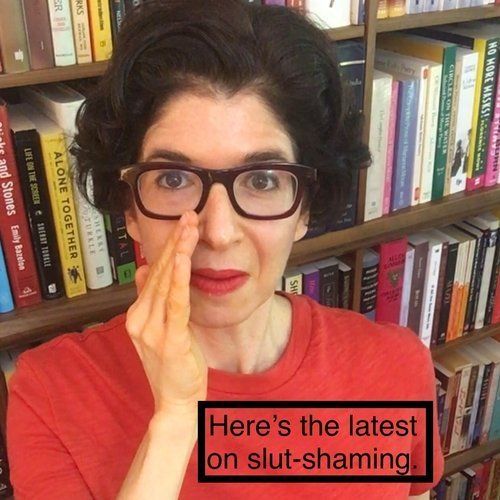THE LEORA LETTER
August 17, 2022

Slut-shaming matters because when people are dismissed as sluts, hoes, and thots, they are denied care and compassion as human beings and in a variety of situations, including when they are sexually harassed, sexually assaulted, and need an abortion.
If you’re a woman leader and you sometimes like to relax and have fun, watch out.

Beyoncé at the 2014 MTV Video Music Awards
Several weeks ago, Beyoncé agreed to change the lyrics to one of her new songs after activists criticized her for using a term that insults people with disabilities. In the wake of this development, Monica Lewinsky tweeted that Beyoncé could also consider revising a line in her 2013 song “Partition” in which she equates Lewinsky with a sex act, reducing the woman who had a sexual relationship with President Bill Clinton to a vulgar punchline.
Lewinsky is right. As I told USA Today earlier this month, if Beyoncé is open to revising lyrics to eliminate ableist language, she also should eliminate slut-shaming language.
For that matter, so should Kanye West, Eminem, and every other entertainer who has mocked Lewinsky. But Beyoncé has raised the stakes of her treatment of women because she famously embraces the label “feminist”; therefore, she should be the one to set an example.
Slut-shaming is a method of judging, shaming, and policing a woman for being inappropriately sexual. It is sexist because we don’t judge, shame, and police men in the same way. I have been tracking slut-shaming for over 25 years and have spoken with over a thousand girls and adult women who have been harassed verbally and assaulted physically as a result of their reputation. (Being sexually harassed or assaulted also can leads to the reputation in the first place.) Repeatedly, I see evidence that many people hold the mindset that boys will be boys, but girls will be sluts.
Slut-shaming matters. When people are reduced to sluts—or synonyms such as “hoes” or “thots” (“thot” is an acronym for “that hoe over there”)—they are denied care and compassion as human beings and in a variety of situations, including when they are sexually harassed, sexually assaulted, and need an abortion.
I have spoken with women of all ages, including girls as young as 11, who have had soda cans thrown at their heads, been told they should kill themselves, and gang-raped because of their reputation as a slut, hoe, or thot. In response, they have gone on to abuse alcohol and drugs, cut themselves, develop eating disorders, and attempt suicide—and some succeed.
A cheap laugh at the expense of Lewinsky—or anyone regarded as slutty—is never just a cheap laugh. It enables a warped, sexist mindset that dismisses the humanity of many people.

Shutterstock
When news broke in 1998 about the Lewinsky-Clinton relationship, culturally we were primed to discredit Lewinsky as an oversexed and pathetic bimbo. This was the decade in which Anita Hill testified that she was sexually harassed in her workplace by her boss, Clarence Thomas, and was mocked by David Brock as “a little bit nutty and a little bit slutty.”
It was just a few years after Bill Clinton, governor of Arkansas, campaigned for the presidency and his political consultant Betsy Wright dismissed allegations of the candidate’s sexual affairs as “bimbo eruptions.”
This kind of thinking was acceptable, normalized, and ubiquitous. Bill Clinton was just a guy doing what guys do, having sex on the side, while the women he was involved with were bimbos, i.e., deviant and disgusting people.
Boys will be boys, and girls will be sluts.
In the 1990s, there was no language to talk about slut-shaming from a feminist lens. The term had not yet been coined. I created “slut-bashing” in 1999, and “slut-shaming” sprouted from the cultural conversation that ensued.
So why in 2022—when “slut-shaming” is part of the vernacular, #MeToo is in our rear-view mirror, and many have reassessed Bill Clinton’s role in the relationship as an abuse of power—do people continue to mock Lewinsky? Today, don’t we know better?
The answer lies in the main ingredient of sluttiness: sexual agency. What makes a slut a slut is the belief that she has actively participated in sexual behavior—and that is what continues to trouble many people. This is the reason that harassment and assault victims who were wearing clothing considered revealing, provocative, or inappropriate are often met with indifference or, worse, blame. This is why rape victims believed to have been “asking for it” are less sympathetic than those who are regarded as sexually innocent. The thinking goes like this: See, she actively did something to provoke her reputation—so we can assume she did something to provoke being harassed or assaulted (which means she wasn’t truly harassed or assaulted). This is one of the factors leading to—as Nona Willis Aronowitz calls it—bad sex.
Lewinsky tests the boundary of compassion for sexually active women because, as the Starr Report recounted, she flirted openly with the president, even exposing her underwear. And even today, many of us still can’t accept a woman who is sexually assertive. It’s telling that the Beyoncé lyric that degrades Lewinsky places Lewinsky as the agent of a specific sex act that in fact the president engaged in, not Lewinsky.
Because Lewinsky exercised sexual agency, many people—including one of the world’s most famous and successful performers who identifies as a feminist—refuse to recognize her humanity.
Beyoncé should apologize to Lewinsky and undo the harm she has inflicted—just as she held herself accountable for perpetuating ableism. Language that degrades one specific human being—leading to the degradation of other human beings—is not innocent. It seeps into our thinking. We need to get rid of it.



